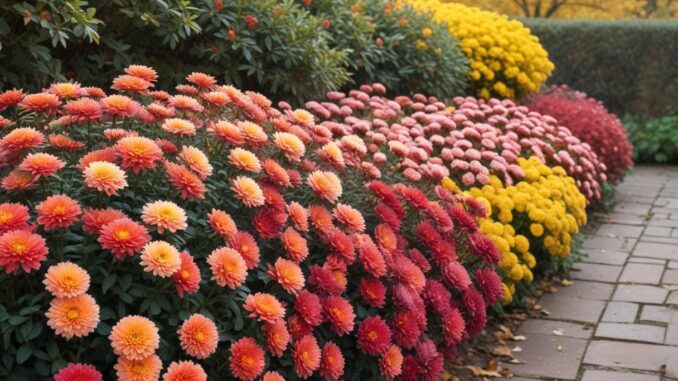
Autumn’s cool breeze might signal the end of summer, but for gardening enthusiasts, it’s the perfect time to refresh your garden with a new array of vegetables and flowers. Whether you’re a seasoned gardener or a homeowner looking to spruce up your outdoor space, this guide will walk you through the best plants to introduce to your garden this season. Ready to get your hands dirty? Let’s dig in!
Why Plant in Autumn?
Autumn might not seem like the ideal season for planting, but it comes with its own unique benefits. The temperatures are cooler, which means less stress on young plants. Additionally, the soil is still warm from the summer sun, providing a nurturing environment for root development. You’ll also deal with fewer pests and diseases, giving your plants a better start.
The Perfect Season for Root Growth
One of the major advantages of autumn planting is the focus on root development. Plants established in autumn have a head start come spring. They use the winter months to grow strong roots, making them more resilient and more robust once the growing season kicks off.
Fewer Pests Around
With the waning heat, many garden pests become less active. This gives your new plants a fighting chance to establish themselves without the constant threat of being eaten or damaged.
Taking Advantage of Natural Rainfall
Autumn often brings more rainfall than summer, reducing the need for manual watering. This consistent moisture helps plants settle into their new homes with minimal effort from you.
Autumn Vegetable Seeds to Plant
Autumn is a fantastic time to plant vegetables that enjoy cooler temperatures. Here are some of the top autumn vegetable seeds for your garden.
Spinach
Spinach is a hardy green that thrives in the cooler autumn months. It’s fast-growing and can be harvested multiple times throughout the season. Planting spinach in autumn ensures you have a fresh supply of leafy greens well into the winter months.
Radishes
Radishes are another great option for your autumn garden. They grow quickly, often ready for harvest in just a few weeks. They also add a nice peppery flavour to salads and other dishes.
Carrots
Carrots love the cool weather and develop a sweeter flavour when grown in autumn. They take a bit longer to mature but are well worth the wait. Plant them early in the season for a bountiful harvest.
Best Flowers to Plant in Autumn
While vegetables are essential, flowers also play a crucial role in your garden’s ecosystem. They not only add beauty but also attract a range of insects. Here are some perfect options for autumn planting flowers:
Pansies
Pansies are known for their resilience and bright colours. They can withstand the first frost and continue to bloom, adding a splash of colour to your garden when most other flowers have faded away.
Chrysanthemums
Chrysanthemums, commonly known as mums, are classic autumn flowers. They come in various colours and can brighten up any garden. They’re also relatively low maintenance, making them a great choice for busy gardeners.
Marigolds
Marigolds are not only beautiful but also act as a natural pest deterrent. Their vibrant hues can add warmth to your garden, and they continue to bloom until the first frost.
Tips for Successful Autumn Planting
Planting in autumn requires a bit of strategy and knowledge. Follow these tips to ensure your garden thrive:
Soil Preparation
Before planting, it’s crucial to prepare your soil. Remove any leftover summer plants and weeds and add compost or manure to enrich the soil, giving your new plants a nutrient-rich environment to grow.
Mulching
Mulch acts as a protective layer for your plants. It helps retain moisture, suppress weeds, and protect roots from extreme temperature fluctuations. A good layer of mulch can make a significant difference in your garden’s success.
Watering Wisely
Although autumn brings more rain, monitoring your garden’s moisture levels is still important. Make sure your new plants receive enough water, especially during dry spells. Too much water can cause root rot, so finding a balance is crucial.
Using Cover Crops in Autumn
Cover crops are a fantastic way to improve soil health during the off-season. They help prevent erosion, improve soil structure, and add organic matter. Here are some excellent cover crops for autumn:
Clover
Clover is a popular cover crop because it fixes nitrogen in the soil, providing essential nutrients for future plants. It’s also great for preventing weed growth.
Rye
Rye is a hardy cover crop that can withstand cold temperatures. It helps improve soil structure and adds organic matter when tilted back into the soil.
Vetch
Vetch is another nitrogen-fixing cover crop that benefits your soil. It’s also great for attracting beneficial insects to your garden.
Preparing for Spring
Planting in autumn isn’t just about enjoying a fall harvest, it’s also about preparing for a successful spring. Here are some steps to take now for a thriving garden next season.
Planting Bulbs
Autumn is the perfect time to plant spring-blooming bulbs like tulips, daffodils, and crocuses. They require a chilling period to bloom, so planting them now ensures a beautiful display come spring.
Cleaning and Storing Tools
Clean and store your gardening tools properly to extend their lifespan. Remove any dirt and rust, sharpen blades, and store them in a dry place.
Conclusion
Autumn is a season of transformation, and your garden should be no exception! Planting the right vegetables and flowers, preparing your soil, and taking advantage of cover crops, can help you to create a garden that thrives through the cooler months and into spring. Ready to take your garden to the next level? Start planting today and enjoy the fruits (and vegetables) of your labour!
